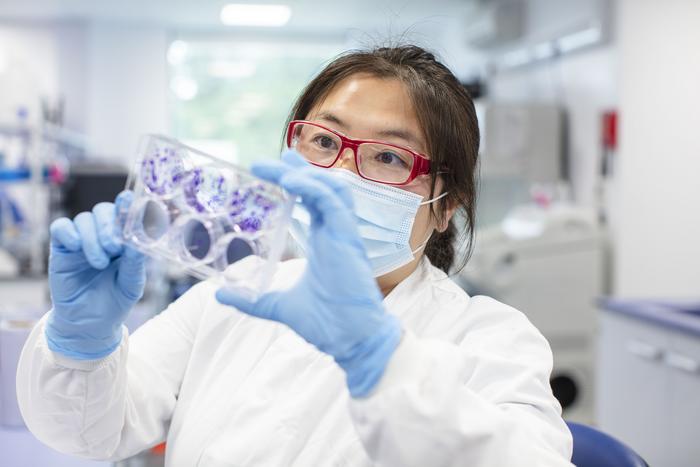Drugs developed to fight blood and other cancers could also help improve the efficiency of radiotherapy in the most commonly diagnosed low-grade brain tumour in adults, a new study has found.

Credit: University of Plymouth
Drugs developed to fight blood and other cancers could also help improve the efficiency of radiotherapy in the most commonly diagnosed low-grade brain tumour in adults, a new study has found.
Meningioma account for approximately 36% of all primary brain tumours. The majority are successfully treated by surgery, but some which can’t easily be accessed need to be treated with radiotherapy. That can cause significant side effects and radiation damage to the brain, while resistance to radiotherapy can also result in tumour growth.
A new study by researchers at the Brain Tumour Research Centre of Excellence at the University of Plymouth looked in detail at the effects of that radiation damage but also ways of mitigating it.
Using meningioma cells, researchers discovered that radiation-induced damage can lead to cells producing an increased quantity of the enzyme Histone deacetylase 6 (HDAC6), which has previously been shown to contribute to tumour growth.
However, by administering the HDAC6 inhibitor Cay10603 prior to radiotherapy, they were able to inhibit cellular growth – and increase cell death – in meningioma samples.
The study – published in the journal eBioMedicine – was led by Dr Juri Na and Professor Oliver Hanemann, and they say their findings represent a potential promising approach to improving the treatment outcomes of malignant meningioma.
The research also builds on extensive and ongoing work by the Centre of Excellence in Plymouth looking at the potential of already-approved medications to be repurposed as a way of helping brain tumour patients.
Dr Na, Senior Research Fellow and the study’s lead author, said: “Cay10603 has been developed to HDAC, a common target for some approved blood cancer drugs. But our study shows that when used alongside radiotherapy, the drug reduces tumour cell growth and increases tumour cell death. It means that this combination treatment will kill cancer cells more efficiently while avoiding serious side effects that could be caused by heavy radiation treatment, as we can administer a low dose of radiation along with Cay10603.”
Professor Hanemann, Director of the Brain Tumour Research Centre of Excellence at the University of Plymouth, added: “Pan-HDAC inhibitors have been approved by both US Food and Drug Administration and the European Medicines Agency, but Cay10603 is not currently licensed in the UK. And no HDAC inhibitors like it have been utilised in clinical settings. It means there are still steps to overcome before this treatment can begin to benefit patients directly, but this is certainly a positive development when you consider the lack of existing treatments available to meningioma patients.”
Brain Tumour Research funds sustainable research at dedicated centres in the UK. It also campaigns for the Government and larger cancer charities to invest more in research into brain tumours in order to speed up new treatments for patients and, ultimately, to find a cure. The charity is the driving force behind the call for a national annual spend of £35 million in order to improve survival rates and patient outcomes in line with other cancers such as breast cancer and leukaemia.
Dr Karen Noble, Director of Research, Policy and Innovation at Brain Tumour Research, said: “We are delighted to see this promising new approach by the team at our Centre of Excellence at the University of Plymouth. We need to keep funding this early-stage research because this is the only way we will find new and improved treatments. We hope this impressive work will lead to clinical trials for meningioma patients.”
The patient perspective
Katie Everett, 31, from Romsey in Hampshire, was diagnosed with a meningioma in July 2021 She has had two operations and six weeks of radiotherapy. Her most recent MRI scan, in February 2024, was stable with no sign of regrowth but she is now on thyroid and hormone medication.
She said: “This development is really exciting and it’s reassuring to know that there is something out there which could help people like me. When I was in hospital, I met a lady with multiple tumours on her brain who had to endure multiple rounds of radiotherapy. It would be lovely to know this will help people like her in the future.”
Journal
EBioMedicine
Method of Research
Experimental study
Subject of Research
Cells
Article Title
Targeting histone deacetylase 6 (HDAC6) to enhance radiation therapy in meningiomas in a 2D and 3D in vitro study
Article Publication Date
24-Jun-2024



